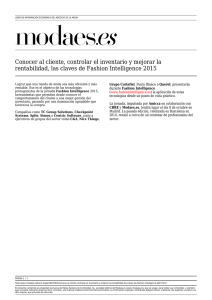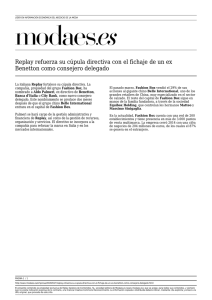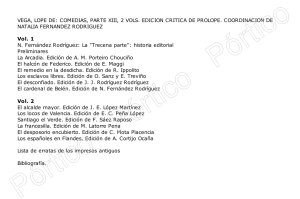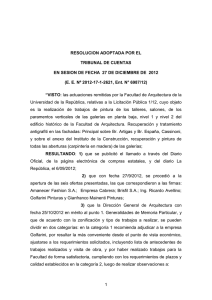Bibliografía
Anuncio
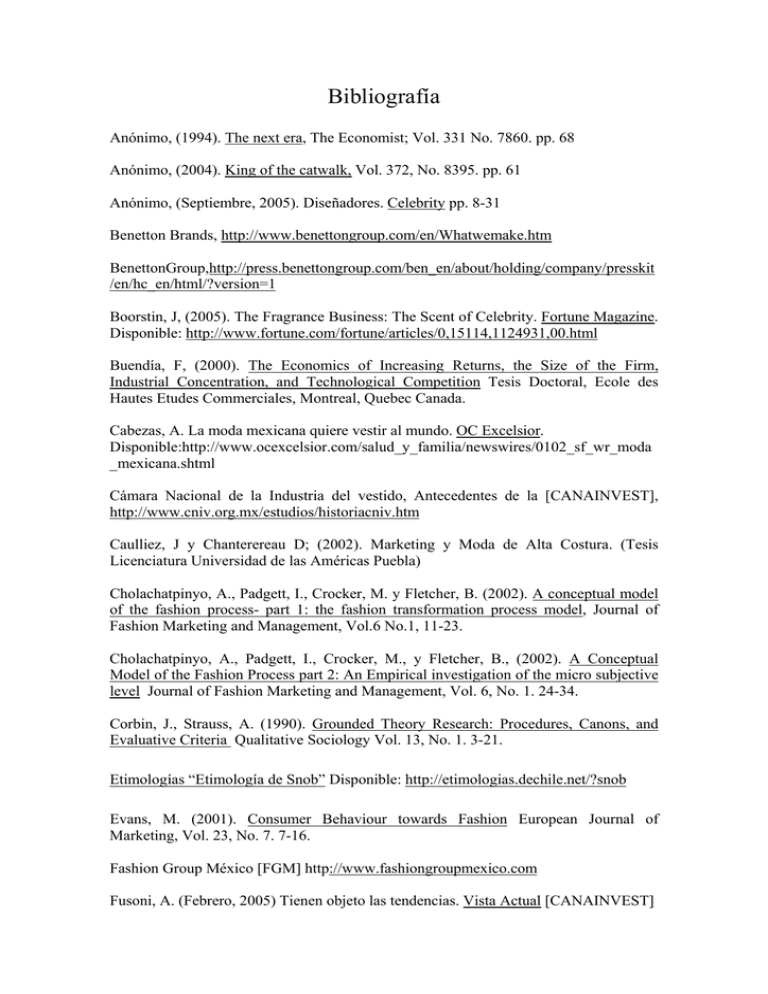
Bibliografía Anónimo, (1994). The next era, The Economist; Vol. 331 No. 7860. pp. 68 Anónimo, (2004). King of the catwalk, Vol. 372, No. 8395. pp. 61 Anónimo, (Septiembre, 2005). Diseñadores. Celebrity pp. 8-31 Benetton Brands, http://www.benettongroup.com/en/Whatwemake.htm BenettonGroup,http://press.benettongroup.com/ben_en/about/holding/company/presskit /en/hc_en/html/?version=1 Boorstin, J, (2005). The Fragrance Business: The Scent of Celebrity. Fortune Magazine. Disponible: http://www.fortune.com/fortune/articles/0,15114,1124931,00.html Buendía, F, (2000). The Economics of Increasing Returns, the Size of the Firm, Industrial Concentration, and Technological Competition Tesis Doctoral, Ecole des Hautes Etudes Commerciales, Montreal, Quebec Canada. Cabezas, A. La moda mexicana quiere vestir al mundo. OC Excelsior. Disponible:http://www.ocexcelsior.com/salud_y_familia/newswires/0102_sf_wr_moda _mexicana.shtml Cámara Nacional de la Industria del vestido, Antecedentes de la [CANAINVEST], http://www.cniv.org.mx/estudios/historiacniv.htm Caulliez, J y Chanterereau D; (2002). Marketing y Moda de Alta Costura. (Tesis Licenciatura Universidad de las Américas Puebla) Cholachatpinyo, A., Padgett, I., Crocker, M. y Fletcher, B. (2002). A conceptual model of the fashion process- part 1: the fashion transformation process model, Journal of Fashion Marketing and Management, Vol.6 No.1, 11-23. Cholachatpinyo, A., Padgett, I., Crocker, M., y Fletcher, B., (2002). A Conceptual Model of the Fashion Process part 2: An Empirical investigation of the micro subjective level Journal of Fashion Marketing and Management, Vol. 6, No. 1. 24-34. Corbin, J., Strauss, A. (1990). Grounded Theory Research: Procedures, Canons, and Evaluative Criteria Qualitative Sociology Vol. 13, No. 1. 3-21. Etimologías “Etimología de Snob” Disponible: http://etimologias.dechile.net/?snob Evans, M. (2001). Consumer Behaviour towards Fashion European Journal of Marketing, Vol. 23, No. 7. 7-16. Fashion Group México [FGM] http://www.fashiongroupmexico.com Fusoni, A. (Febrero, 2005) Tienen objeto las tendencias. Vista Actual [CANAINVEST] Jiménez, M. (Entrevista personal, septiembre 30, 2005) Latiniando “ El Universo http://club.telepolis.com/Latiniando/latin3.htm del Latín” Disponible: Lavin, L. (Febrero, 2005) México esta de moda, y el diseño hará que se mantenga de Moda. Vista Actual Louis Vuitton, www.louisvuitton.com LVMH, www.lvmh.com Martínez, J. (Octubre-Noviembre 2003).El secreto de Zara. Expansión No. 887. pp. 5768 Mattila, H., King, R., y Ojala N., (2002). Retail performance measures for seasonal fashion Journal of Fashion Marketing and Management, Vol. 6, No. 4. 340-351. Miller, C., McIntyre, S., y Mantrala M., (1993). Toward Formalizing Fashion Theory Journal of Marketing Research, Vol. 30. 142-157. Moore, C., Fernie, J., Burt, S. (2000). Brands without boudaries, European Journal of Marketing, Vol. 34 No. 8, 919 - 937. Pesendorfer, W. (1995). Design Innovation and Fashion Cycles. The American Economic Review, Vol. 85, No. 4. 771-792. Promostyl, http://mexcostura.com/34/promostyl.htm Sproles, G. (1981). Analyzing Fashion Life Cycles Principles and Perspectives Journal of Marketing, Vol. 45. 116-124. Summers, J. (1970). The Identity of Women’s Clothing Fashion Opinion Leaders, Vol. 7. 178-185. Summers, J. (1972). Media Exposure Patterns of Consumer Innovators Journal of Marketing, Vol. 36, 43-49. Wasson, C. (1968). How Predictable are Fashion and Other Product Life Cycles Journal of Marketing, Vol. 32, 36-43.
